Life Along the BorderBy Jesús Mena This trio of short stories tied for first place in the 2017 Writing Contest sponsored by the San Miguel Literary Sala, A.C., located in San Miguel de Allende, Guanajuato, Mexico. This feature first appeared in Somos en escrito on February 23, 2017. The Spirit We lived in a string of lean-tos behind an old service station next to Emilio’s Bar. All the families living here were just like chickens, going to bed at sunset, not because nature dictated our clocks, but because any light in a one-room hovel alerted the migra that mojados who had crossed the Rio Grande in the dead of night were nesting here. A four-year-old at the time, I was sleeping on the floor on the soft, red blanket that was my bed when late one night my grandmother flicked on the bare light bulb dangling from the ceiling. She stumbled in with our neighbor Victoria leaning against her shoulder. Victoria’s eyes were slits, her face ashen. My grandmother, who was a curandera, slid Victoria onto her bed and quickly ushered me out the door. “Vámonos! Fuera!” “What’s going on, huelis?” I whimpered. “Shht!” she shushed firmly, her finger on her lips. I had already weathered my share of immigration raids so when my grandmother demanded silence, I was a mouse playing dead. But my body shuddered when I heard dreadful groaning coming from inside our shelter. Victoria was in agony. Was she dying? The full moon that loomed over the large mesquite tree across the alley was a gray skull baring its ugly teeth at me. I could not bear to look at it so I sat on the cracked sidewalk, chin on my knees, staring at the alley and trying to ignore the wailing. It seemed like hours before my grandmother stepped out carrying a bucket filled with foul-smelling water that she splashed onto the alley. The water stained the gravel an eerie gray in the moonlight. I grabbed her skirt and pleaded, “Can I go in now, huelis? Please?” “Cállate, niño!” she uttered, shoved me aside, and rushed back in. Now I was terrified. My huelis loved me. She had never treated me like this. Victoria began screaming: “No! No!” Then I heard sobbing. I rushed to the door, hoping I could sneak a peek. The adults inside started arguing then the light seeping through the cracks of the wooden door went out, the rusty doorknob squeaked as it turned, and Victoria’s husband stepped out carrying a dark bundle followed by my father and my grandmother. My mother called me back in and put me to sleep. The hard wooden floor was humid, giving off a dull musty odor. Later that night I woke up screaming when I saw a translucent, blue figure floating through our shack. My grandmother ran to my side and picked me up in her arms. She brewed an herbal tea for me to fend off bad dreams and cuddled me on her lap, rocking me to sleep. Dawn came and my grandmother and my parents acted as if nothing had happened. No matter how much I pestered them, they dismissed my questions about the night before. We moved out of the area when my father landed a good-paying job as a plumber, but images of that eerie night were indelibly etched in my mind. My grandmother always assured me that my childhood imagination had conjured up this dark tale. It was not until she suffered a stroke that placed her at heaven’s door that she decided to rid herself of her earthly burdens. “Te acuerdas…de..de..aquella noche,..mi’jo…” she said, her voice faltering as she recounted what had happened that strange night. Victoria had had a miscarriage, she said. They didn’t call the priest to give the child his final blessing because the priest was an Anglo. They were afraid he would call the migra. They had buried the child in the empty lot behind Emilo’s Bar, and my grandmother had said the final prayers. Her dying wish was that God would forgive her. Her revelation was jarring. That lot with its scraggly bushes once was my favorite place to play hide-and-seek. It was also my sanctuary whenever I got in trouble with my parents. I had carved out a small hideout in the brush where I found solace. Somehow I felt like I had a friend there to console me. I lost that little haven when the garage owner turned that lot into a place for oil changes, and the earth gradually darkened to a pitch-black. The image of a baby drenched in this waste haunted me. My soul yearned to pay my last respects. I went to my hometown, which had grown into a small city with a cluster of ramshackle cottages on its outskirts. Ankle-high weeds covered the backyards there with well-worn paths leading to sagging outhouses; kids were playing stickball in the alley. I felt at home. But my old barrio was quite a ways from those shanties. I finally reached the street where we once lived. The panaderia at the street corner that once filled the air with the sweet scent of cinnamon from freshly baked pan dulce had been supplanted by a dry cleaner. The garage and the bar had been leveled, replaced by a large cinderblock building. A grocery store occupied the portion of the structure where the garage used to be. Next door, there was a sign that read La Señora Adivinadora with a large Tarot card taped to the windowpane that showed Persephone, the high priestess sitting on her throne between the darkness and the light in front of the Tree of Life. I walked into La Señora’s place, which had a glass counter with a collection of talismans mounted on shelves and a black curtain separating the small front room from the rear. The curtain slid open and a somber woman with dark brown eyes and black flowing hair strolled out. Around her neck hung a gold chain with an image of the Virgen de Guadalupe set in mother of pearl. “Buenas tardes,” she said as she walked to the counter. “Would you like me to read your fortune?” I looked past her to the rear of her unit, which stretched all the way to the alley. Concrete now covered the former back lot of Emilio’s Bar. “Come into my reading room back here,” she said. “A special spirit resides there that guides me.” I pursed my lips. “I know,” I nodded as I closed my eyes. The Stetson Winter unleashed heavy downpours that battered noisily against the windowpanes. Gonzalo tossed and turned. His older brother Maurilio was snoring exceptionally loud tonight. It was a nightly ritual that began with hoarse guttural mutterings that would then dull into a drone before Maurilio would finally slide into a deep sleep. The steady drip of the rainspouts added to his insomnia. With Maurilio’s snore down to a whisper, it became the mouse that prevented Gonzalo’s slumber. That vermin had been harassing the family for weeks despite the traps that had been set throughout the house. He heard it scratching at some package in the kitchen cabinet. He listened intently, hoping to hear the loud thump that said: This rata is dead meat! When it was satisfied with its treasure, the mouse scurried down the hallway, its claws rasping against the wooden floor, avoiding all the mines scattered on the floor. It was quiet again. The chiming of the clock told him it was midnight when his father’s truck pulled into the driveway. The pickup door opened and slammed shut. He heard his father come in the front door. His mother was still awake. “Hola, mi amor, I’m home,” he said jovially. “Where the hell have you been?” she asked. “Is that any way to greet your viejo?” he asked. When he was drunk, he was always sure he could sweet-talk her out of anything. They had been fighting for weeks. Gonzalo’s mother Mencha always made light of the squabbles whenever he asked her what was going on. The arguments that vibrated through the sheer walls usually began with his mother taking his flattery quietly for a while before the exchanges flared into nasty quarrels. Tonight, however, she seemed to have little patience for his accolades. “Ándale preciosa! Let’s jump into bed and make out like old times,” he said. “Those days are long gone,” she said sternly. “Ay dios, you are a lioness tonight,” he said, laughing lightly. “What got into you?” “Maybe I’m tired of being taken for a pendeja?” “I always treat you with respect,” he snapped. “Really? Partying till all hours? We’re barely making ends meet, and you don’t even come home from work on payday. You go out and spend money like it’s nothing.” “You worry too much, amorcito,” he said. “Come on, let’s have some fun.” “Get your filthy hands off of me,” she said. “You are my wife and I am going to make love to you,” he said firmly. “What? You didn’t get enough with Carla tonight?” “Carla? Who is Carla?” “You know what I am talking about! My friends have seen you with her. Una cantinera! Que asqueroso!” “Ay, amorcito mío. Chismes, chismes, chismes,” he said dismissively. “You believe everything you hear.” “I saw you tonight with her! Julia drove me over to the bar, and we waited till you left with her.” “I don’t know what you are talking about,” he said. “You filthy liar. Get the hell out of here! I never want to see you again!” There was a dead silence. “If I leave tonight, you will never see me again,” he said. “That will be too soon!” Gonzalo heard the front door bang shut, his father’s hurried steps on the porch, and the pickup rush out the driveway. His mother’s sobbing sent his heart racing. He desperately wanted to comfort her. He struggled to get up but his legs felt like lead weights. What could he tell his mother? How could he possibly soothe her? He found himself sinking into a dark pit as he sobbed himself to sleep. Mencha’s sadness blanketed the house like a fog the next day. She avoided Gonzalo anytime he tried to talk to her. He told Maurilio what he had heard the night before, and the two of them finally approached her. “Don’t worry, Amá, he’ll be back,” said Maurilio. “He wouldn’t walk away from us.” “He has nowhere else to go,” agreed Gonzalo. But the weeks turned to months without word of his whereabouts. His father’s departure spawned a deep guilt in Gonzalo. He should have had the cojones to get out of bed and intervene. He kept recreating the fight. All he had to do was step in and ask them what in the world was going on, and they would have been embarrassed and calmed down. Maybe they could have worked things out. Instead, he had just cried like a baby. An 11-year-old baby, for Christ’s sake. What pained Gonzalo most was how his mother’s life changed. She became the neighborhood tailor, stitching dresses for quinceañeras and other special occasions but the money she pulled in was not enough. She started cleaning homes for gringos on the other side of town, cooking, scrubbing floors, changing baby diapers, and doing laundry. On her first day, she left well dressed, eager for the challenges of the new job. She came home exhausted and just scrambled some eggs and frijoles for dinner. Her eyes slowly lost their luster. The thought of his mother on her hands and knees in some gringo home burned a hole in Gonzalo’s belly. He argued with her to stop working. He could drop out of school, get a job, but she was adamant that her kids would graduate from high school and carve out a better life. Gonzalo’s father now seemed like a ghost from his childhood – a carpenter who straggled home from work every day with his frayed Stetson sprinkled with sawdust. He would shake off his hat off in the front yard, walk in, smile at the family and head for the bedroom to read Western dime novels. He was a sullen man who ignored the silly banter or the rowdy spats between the boys around the dinner table. He wasn’t a real father. Gonzalo felt he had been abandoned since birth, a void that bred a rancor that gnawed through the remnants of his childhood innocence. Each night Gonzalo dreamed that he stood before the shell of a house under construction. There was the dense, sweet smell of sawdust and the piercing whine of the saw. He’d step in and his father stopped pounding his hammer, tipped back his hat, and stared at Gonzalo with a smile. Livid, Gonzalo struggled to confront him but found himself staring, impotent with rage. Eliminating all that reminded him of his father became an obsession. He trashed the stack of his father’s paperbacks that were covered with dust. He urged his mother to dump all of his father’s belongings. She refused. “They are his and he will return and get them one day,” she said. Gonzalo frowned. “Amá, how can you believe that jerk will ever return?” “Don’t you ever use such language in referring to your parents,” came her indignant reply. Her response only fueled his drive to erase his father’s existence from his world. One sunny afternoon when the family had fired up their barbecue pit in the backyard, Gonzalo was rummaging through his parent’s closet in search of a folding chair when his eyes zeroed in on his father’s dressy Stetson that he wore on his weekend parandas. He stared at it, grabbed it, walked out and threw it in the barbecue pit. Mencha gasped. The three of them looked on with an almost pious silence as the hat burst into flames and slowly became a gray sliver that blended into the burning charcoals. Fallout The drone of Mrs. Gray’s math class recital suffocated my thoughts. She bored me stiff. Mrs. Gray eyed the classroom as she paced the length of the blackboard, carefully seeking her next victim. She seemed to enjoy making us squirm. “Moisés, can you recite the nine’s multiplication table?” she said. Moisés walked timidly to the front of the class. He was clearing his throat when the shrill wail of the town siren shattered Mrs. Gray’s spell. We all leaped from our seats and scurried under our desks. From my hunched position, I watched an imposing Mrs. Gray march up and down the aisles, inspecting all the crouched bodies, making sure everyone was in the proper fetal position. “Make sure you are covering your eyes,” she said, raising her voice over the siren’s whine. “Benigno, get your legs completely under the desk.” The siren ceased its howl, the drill ending too soon, so we all crawled out from under our desks. I raised my hand before the teacher resumed her lesson. “Mrs. Gray, why do we cover our eyes in a bomb drill?” I asked. “To protect your eyes,” she said. “You could go blind from the light of an atomic explosion.” “But how does that protect us from radiation?” Mrs. Gray looked annoyed. “You know the auditorium is designated as a fallout shelter. Once the explosion is over, we’d go to the auditorium.” “But it’s got big windows. How can it protect us from radiation?” “And what about everyone else in town? ” chimed in Benigno. “Where are my parents supposed to go if they dropped a bomb on us?” “The town has a fallout shelter,” Mrs. Gray said frostily as the bell rang and we all raced raucously from the room and headed home. Moisés, Benigno and I savored the shade of the magnolia trees that towered over the landscaped yards on the gringo side of town as we walked home that muggy afternoon. “Did you guys check out the note Mrs. Gray sent home?” I asked. It was an official city memo that asked families to set aside a month’s supply of canned and dried foods, water and other necessities. It was part of the nuclear-preparedness program that city officials had unfurled with much fanfare. “A month? Sometimes we’re lucky if we got a pot of beans at the end of the week,” said Moisés. “I’m not gonna show this to my Dad,” said Benigno. He yanked the note from his book, crushed it into a wad and thrust it into the corner garbage can. We grew quiet. The three of us had seen the newsreels in the movie theater a couple of months ago warning all Americans to prepare in case Russia nuked our country. The film was frightening – an atomic bomb going off with a horrific boom followed by a ball of fire that spread into the sky like a giant mushroom. “Do you really think they’re gonna drop a bomb on our little town?” asked Benigno. “Of course. The Russians got a bomb aimed at every town in America,” I said. Benigno looked depressed. “The city bomb shelter is on the gringo side of town,” lamented Benigno. “How are my parents and my little sister gonna get there? We don’t even have a car.” “We gotta do something to help our families,” I declared. “Like what?” asked Moisés. “We could build our own fallout shelter,” I said, a bit surprised at myself. They looked at me skeptically. “Really?” asked Moisés. “Just how are we gonna do that?” “I don’t know but we gotta figure it out.” Moisés shook his head. “If we get hit, we might turn into some kind of nuclear monsters…” growled Moisés as he contorted his face, moaned and breathed heavily then started chasing Benigno. Benigno shrieked and sprinted away. My friends were trying to laugh it off but I knew they were as worried as I was. When I got home, my father had me lug some scrap lumber from his dusty blue pickup and stack it in the backyard. “What’s this for?” I asked. My father was a carpenter who would never let any lumber go to waste. “Not sure…might come in handy someday,” he said. “Can I have some of it?” “What you planning…a clubhouse?” “Something like that.” “You know where the nails and hammers are. Just don’t mess up my saw,” said Dad with a smile. I was ecstatic. It was the first time Dad had trusted me with his most prized possession – his electric saw. Lumber, nails, tools – we had everything we needed to build the fallout shelter. I rushed next door to tell my buddies. “Hey you guys! I got the stuff we need to make a bomb shelter.” Moisés and Benigno rushed over to my place to see but they seemed less than enthusiastic when they stared at the pile of mangled scrap with splinters and nails jutting out at odd angles. “You couldn’t build a doghouse with that,” said Moisés. When I pulled out my father’s electric saw, their eyes lit up. I squeezed the trigger switch and the silver blade roared to life. “Let me try that,” said Moisés. “I’ll teach you how to use it…if we build the shelter.” Benigno smiled, picked up a hammer and began driving rusty nails out of the lumber. My chest swelled as I taught Moisés how to use the saw. We began arguing about the proper architecture with the debate getting heated at times. The intermittent whine of the power saw and the banging of hammers soon eliminated the chatter. I called the club to order as I crouched on a small wooden crate. The shelter was finished except for the lead lining needed to protect us from radiation. Being the entrepreneur, I had talked Moisés and Benigno into chipping in fifty cents each to buy some baby chicks. We planned to raise them into hens, sell the eggs they laid and, when the hens were too old to produce, we could sell them to make chicken soup. Our chickens would be cheaper than the ones at Hinojosa’s Market. We would make a killing in the neighborhood. The income would get us the lead we needed. Of course, bold ventures invariably encounter obstacles. Our first challenge was sharing our hideout with the chicks. It’s hard to conduct a serious business meeting with chicks darting in and out between your legs. With time, our troubles grew. “You guys, it’s starting to smell in here,” complained Benigno. “It’s chicken shit,” groused Moisés. “That’s why chickens live in chicken coops, not in fallout shelters.” Suddenly one of the chicks let out a shrill cry and hobbled as it raced in circles. Moisés had accidentally stepped on it. “Damn it, Moises! You almost killed one of our investments,” I yelled. “Investments, my ass!” cried Moisés. “Who would want to come into this stinkin’ fallout shelter? We don’t even know where we can get the lead even if we had the money.” “Don’t worry, I’ll figure it out.” Unfortunately, he was right. I had no idea where to get the lead. One day I was helping my father build a new house when I saw the plumber pouring a silver liquid to seal the drainage pipe he was installing. Molten lead! How could I have been so blind? Plumbers used lead to seal pipes! Our problem was solved. I called a meeting of my buddies to unveil my discovery. We all headed to the shelter, and I unlocked the latch, jiggled and kicked the twisted door until it finally came loose. “Watch out for the chicks,” said Moisés. More than once they had escaped, and we ran ourselves ragged chasing hyperactive little feather balls. I crouched down with a watchful eye but none of the chicks even peeked through the crack I opened. I slowly swung the door open ready to snatch any chick that made a run for it. None did. It was quiet. Too quiet. “Something’s wrong.” We walked in and looked around. “Holy shit!” said Moisés. The neighborhood alley cat had apparently dug his way under the dirt floor and gobbled up our little treasures. There was nothing left but feathers strewn on the ground. We were speechless. “What a drag – que pinche aguite!” muttered Moisés after a drawn-out silence. “I told you we should’ve built a floor to this thing.” “We didn’t have enough lumber,” I said. “So much for the fallout shelter,” sighed Benigno. It was also the end of our club. I was never able to coax the guys into starting up again. I’ve always felt that I failed to capitalize on the dramatic potential of our project. It could have been the basis for a great science fiction screenplay. Picture a newscast that erroneously reports that the Russians have just launched a nuclear attack on the United States. People scurry for cover, quickly overwhelming the city’s designated fallout shelter. In the chaos, the mayor and some of his cronies are stranded on our side of town. They come to our sanctuary, pleading for a chance to enter our shelter. Gringo politicians begging Chicano kids for a share of the fruits of their labor? That’s a story line that would light up faces in any barrio. 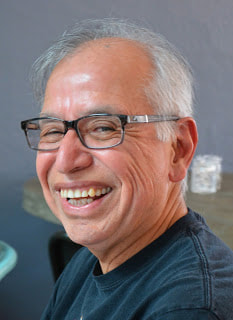 Jesús Mena, the son of undocumented Mexican immigrants from the south Texas Rio Grande Valley, grew up as a migrant farm worker, following the crops each year with his family along the entire US Midwest corridor. He was managing editor of ChismeArte, a pioneering Latino literary journal. After stints as a journalist with various newspapers including the Brownsville Herald, Orange County Register and Oakland Tribune, he became director of media relations for UC-Berkeley and subsequently held a similar post at the Harvard University Kennedy School of Government. Jesús is currently working on a historical novel set in the Rio Grande Valley in the early 1900s.
0 Comments
Rinconcito Instrucciones para la FronteraPor Oscar Moreno Si alguna vez le vuelves a caer a Juárez y tienes que y puedes regresarte al El Paso, te puedo dar algunos tips, depende de lo que quieras hacer. A los gringos y pochos les choca que te vean medio Mexicana. Con ellos tienes que ser completamente gringa o completamente pocha, lo cual quiere decir que mínimo tienes que ser medio gringa o medio pocha. Para los pochos, ser medio Mexicano es puro pedo. ¿Qué tienes que hacer? Primero, si andas en Juaritos, en tu casa o dónde andes, deja tu IFE, tu pasaporte Mexa, tu credencial caducada de la UACJ, tu licencia de Juárez, todo. Llévate tu pasaporte gringo, tú licencia del chuco. Segundo, nunca hables español. Puro Inglés. No dejes que se te salga ni una sola letra de español. Ahorita que estamos aquí en el puente, pues quien nos oye, pero ya cruzando con los oficiales, haz de cuenta que llegó el Will Smith y te echó un flashazo de todo tu tiempo en México. Tercero, que no te agarren viendo a Juárez. Mal plan que tu cantón este tan cerca. Yo no tengo buen ojo, pero desde el puente lo puedo ver. Cuarto, cuando vayas de Juárez a El Paso, deja todos tus pesos en casa. Que no te agarren los gringos o pochos enseñando a Sor Juana Inés de la Cruz, para ellos, puro George Washington. A los del 656, les valdrá wilson, nomás aguas porque luego puede que te acaben pidiendo un poco para ahorrarse espacio de billetes en sus carteras, con eso de que ahorita un dólar equivale a cómo veinte pesos. Yo sé que la regaste. Yo sé que nunca pensaste en acabar acá. Pero por cómo pintan las cosas, puede que regreses. Ahora, estando en Juárez, seguramente te van a decir güera, sobre todo por lo blanca que estás. Pero solo un imbécil pensaría que eres gringa, pero si pasas por pocha que nunca ha pisado tierra Mexa. Te van a hablar en Inglés de chiste, te van a decir “Go, UTEP!” a pesar de que esa no es la porra y a pesar de que no terminaste tu licenciatura acá. La misma gente que te trató de la patada sirviéndoles alitas en el Grand China Buffet, te va a tratar de la patada cuando les quieras regalar quesitos y jamonsitos en Costco sucursal Juárez. Te trataron de la patada en el Circle K de la Airport cómo cuando me dijiste de una morra que se encabronó porque no le vendiste birria con una licencia de conducir falsa, y te dijo que eras una “pinche pocha pendeja”. Nomás porque vio tu apellido en tu gafete, te vio güera y te oyó gringa. Aguanta vara porque algún bato te va a querer tirar rollo diciendo que votaste por Trump, cuando el día de las elecciones nos conocimos pagando multas en la corte. Te la van a regar por haber estudiado diseño gráfico en IADA cuando ya no pudiste terminar en El Paso y van a creer que con lo nerda que eras en la Prepa del Chami, que siempre pudiste haberte ido a una ingeniería. De seguro tu misma lo pensaste cuando a tu jefe le colgaron los tenis. Menos mal que no te dijó que te fueras a la burger cómo me lo dijo mi jefe antes de que lo cagara el payaso. Que descanse en paz y que Dios lo bendiga. Ni pedo, chamaca. La regaste cómo muchos la regaron cuando se soltó el desmadre de violencia generación 2007-2012. El desmadre que nunca terminó y no te hagas, que tú también hiciste el tuyo. Este sería consejo extra, no te lo tengo que decir, pero aguas con cargar droga, ya tienes antecedentes por un pinche gallo de uso personal. No debería ser así, pero por el güero enojón ese, ya cualquier pretexto te buscan. Y si no te encuentran pretexto, se lo inventan. Date cuenta, eres la enemiga número uno de ellos, con todo el coraje y el miedo del mundo. Así fue, así es y así será siempre aunque no hayas hecho nada malo a nadie más que a ti misma, y no hablo de los gallos, que si traes, comparte. No, pero lo que nunca entendiste es que hay un lugar y un momento para todo pero estando acá, si veo cómo puede valerte queso. No sé si fue Silvio Rodríguez o José Alberto Jiménez o Mijares o Arjona el que cantó que no soy de aquí ni de allá. Pero no creo porque ninguno de esos cabrones era de Juárez. El desmadre personal ya se acabó, te toca decidir que sigue. Ahí te agarro dibujando sobre tu pierna y tus brazos, son caricaturillas pero son mejores que los tatuajes que se avientan los disque machos gangstas de acá o los chami-cholos de allá. Si te dicen que no tienes futuro, nada más acuérdate que muy probablemente mañana vas a despertar.  Oscar Moreno, born and raised in Ciudad Juárez, Chihuahua, México, endured the crime wave that took over his hometown in the late 2000s. During that time, he studied Creative Writing at the University of Texas at El Paso and then did a Master’s in Art and Design in the Autonomous University of Ciudad Juárez. He’s now in the Creative Writing MFA at UTEP, commuting every day across the border. Rinconcito |
Archives
June 2024
Categories
All
|
Donate and Make Literature Happen
is published by the Somos En Escrito Literary Foundation,
a 501 (c) (3) non-profit, tax-exempt corporation. EIN 81-3162209

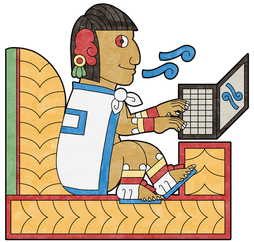
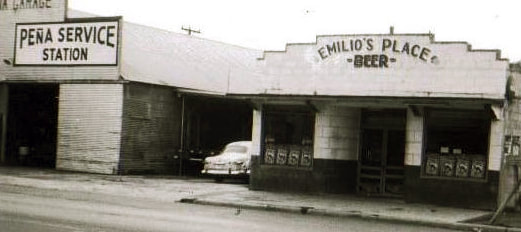


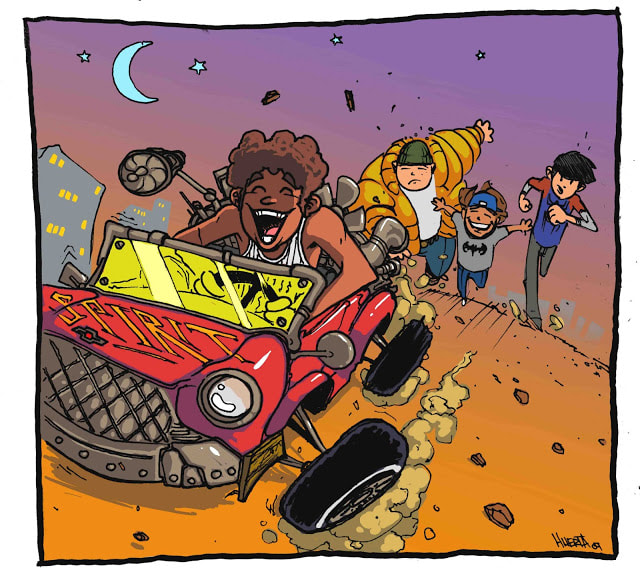
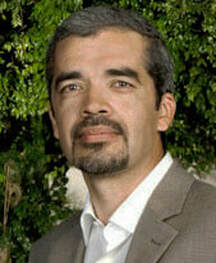
 RSS Feed
RSS Feed